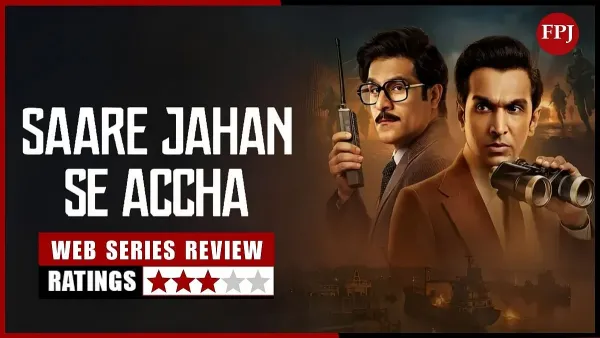
The series offers sharp tension, moral murkiness, and political intrigue, yet struggles with uneven pacing and a protagonist who feels more plot device than person. Its writing shines when blurring the moral line between ‘us’ and ‘them’, but dims when it defaults to patriotic binaries
Title: Saare Jahan Se Accha
Director: Sumit Purohit
Cast: Pratik Gandhi, Sunny Hinduja, Suhail Nayyar, Kritika Kamra, Tillotama Shome, Rajat Kapoor, Anup Soni
Where: Netflix
Rating: 3 Stars
Saare Jahan Se Accha: Review
The series takes the familiar India–Pakistan rivalry and cloaks it in a 1970s espionage drama. RAW agent, Vishnu Shankar, is sent to sabotage Pakistan’s nuclear ambitions. Along the way, we encounter shadowy informants, double-crosses, and the occasional dressing-gown-clad scientist. The plotting starts with the air of a serious espionage drama but occasionally veers into pulp and melodrama.
While the series maintains a taut narrative for much of its six episodes, it occasionally succumbs to a slow burn, more flickering candle than controlled detonation. The historical framing is intriguing, but the 1970s setting feels undercooked as dialogue and styling sometimes slip into modern-day cadences, breaking the illusion. Still, the central thread on how much individuals sacrifice for their nation remains compelling enough to keep you watching.
Saare Jahan Se Accha: Actors’ Performance
If espionage dramas are chessboards, Sunny Hinduja’s Murtaza is the queen, commanding, unpredictable, and stealing the scene from the supposed protagonist. Pratik Gandhi’s Vishnu is credible as the ever-watchful operative, but the writing leaves him frustratingly opaque; he is the lead yet somehow not the most interesting man in the room. Suhail Nayyar’s Sukhbir emerges as the emotional anchor, lonely, layered, and possibly worthy of his own spin-off.
Rajat Kapoor delivers as the inscrutable RN Kao the chief of RAW, all understated menace and strategic patience. Tillotama Shome, as Vishnu’s wife Mohini, is magnetic in her limited screen time, while Anup Soni and Kritika Kamra lend credibility to their conflicted roles. The ensemble is strong, but one suspects that a narrative built around Sukhbir and Murtaza might have been far richer than the Vishnu-centric plot we are handed.
Saare Jahan Se Accha: Music and Aesthetics
The multilingual exchanges—Hindi, Urdu, Punjabi, and English—are a quiet triumph, lending authenticity and warmth to a tale otherwise driven by cold national agendas. There’s a natural cadence to the Punjabi that feels lived-in, a rare treat in a Hindi series. However, the period detailing is inconsistent. It crackles with atmosphere, but the setting feels vaguely retro rather than convincingly 1970s.
Musically, the score is serviceable, leaning on tension-building motifs without venturing into truly memorable territory. One might have hoped for bolder sonic choices to match the high-stakes plotting. Still, the show’s tonal palette—earthy, shadowy, and occasionally laced with ironic humour keeps it aesthetically engaging.
Saare Jahan Se Accha: FPJ Verdict
Overall, the series offers sharp tension, moral murkiness, and political intrigue, yet struggles with uneven pacing and a protagonist who feels more plot device than person. Its writing shines when blurring the moral line between ‘us’ and ‘them’, but dims when it defaults to patriotic binaries. In the crowded bazaar of spy thrillers, Saare Jahan Se Accha won’t floor you with a knockout, but it slips in enough sharp jabs to leave a mark.